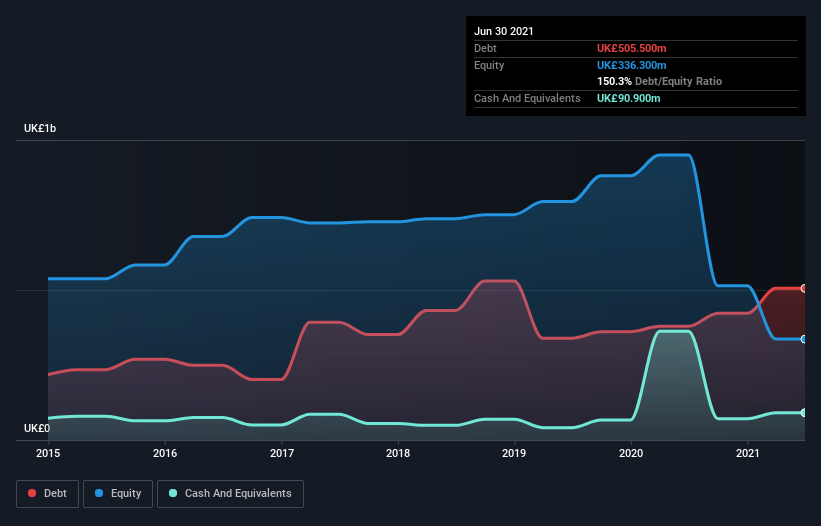David Iben put it well when he said, 'Volatility is not a risk we care about. What we care about is avoiding the permanent loss of capital.' When we think about how risky a company is, we always like to look at its use of debt, since debt overload can lead to ruin. We note that IWG plc (LON:IWG) does have debt on its balance sheet. But is this debt a concern to shareholders?
What Risk Does Debt Bring?
Generally speaking, debt only becomes a real problem when a company can't easily pay it off, either by raising capital or with its own cash flow. Ultimately, if the company can't fulfill its legal obligations to repay debt, shareholders could walk away with nothing. However, a more common (but still painful) scenario is that it has to raise new equity capital at a low price, thus permanently diluting shareholders. Of course, the upside of debt is that it often represents cheap capital, especially when it replaces dilution in a company with the ability to reinvest at high rates of return. The first thing to do when considering how much debt a business uses is to look at its cash and debt together.
View our latest analysis for IWG
How Much Debt Does IWG Carry?
As you can see below, at the end of June 2021, IWG had UK£505.5m of debt, up from UK£378.8m a year ago. Click the image for more detail. However, it does have UK£90.9m in cash offsetting this, leading to net debt of about UK£414.6m.

A Look At IWG's Liabilities
According to the last reported balance sheet, IWG had liabilities of UK£2.12b due within 12 months, and liabilities of UK£5.99b due beyond 12 months. Offsetting these obligations, it had cash of UK£90.9m as well as receivables valued at UK£718.8m due within 12 months. So its liabilities total UK£7.29b more than the combination of its cash and short-term receivables.
This deficit casts a shadow over the UK£3.12b company, like a colossus towering over mere mortals. So we definitely think shareholders need to watch this one closely. After all, IWG would likely require a major re-capitalisation if it had to pay its creditors today. There's no doubt that we learn most about debt from the balance sheet. But it is future earnings, more than anything, that will determine IWG's ability to maintain a healthy balance sheet going forward. So if you want to see what the professionals think, you might find this free report on analyst profit forecasts to be interesting.
Over 12 months, IWG made a loss at the EBIT level, and saw its revenue drop to UK£2.2b, which is a fall of 17%. We would much prefer see growth.
Caveat Emptor
While IWG's falling revenue is about as heartwarming as a wet blanket, arguably its earnings before interest and tax (EBIT) loss is even less appealing. Indeed, it lost UK£32m at the EBIT level. When we look at that alongside the significant liabilities, we're not particularly confident about the company. We'd want to see some strong near-term improvements before getting too interested in the stock. For example, we would not want to see a repeat of last year's loss of UK£582m. And until that time we think this is a risky stock. When I consider a company to be a bit risky, I think it is responsible to check out whether insiders have been reporting any share sales. Luckily, you can click here ito see our graphic depicting IWG insider transactions.
At the end of the day, it's often better to focus on companies that are free from net debt. You can access our special list of such companies (all with a track record of profit growth). It's free.
New: AI Stock Screener & Alerts
Our new AI Stock Screener scans the market every day to uncover opportunities.
• Dividend Powerhouses (3%+ Yield)
• Undervalued Small Caps with Insider Buying
• High growth Tech and AI Companies
Or build your own from over 50 metrics.
This article by Simply Wall St is general in nature. We provide commentary based on historical data and analyst forecasts only using an unbiased methodology and our articles are not intended to be financial advice. It does not constitute a recommendation to buy or sell any stock, and does not take account of your objectives, or your financial situation. We aim to bring you long-term focused analysis driven by fundamental data. Note that our analysis may not factor in the latest price-sensitive company announcements or qualitative material. Simply Wall St has no position in any stocks mentioned.
Have feedback on this article? Concerned about the content? Get in touch with us directly. Alternatively, email editorial-team (at) simplywallst.com.
About LSE:IWG
International Workplace Group
Provides workspace solutions in the Americas, Europe, the Middle East, Africa, and the Asia Pacific.
Reasonable growth potential with low risk.
Similar Companies
Market Insights
Community Narratives





